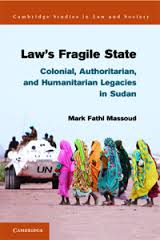 by Mark Fathi Massoud. Cambridge: Cambridge University Press, 2013. 304pp. Cloth $99.00. IBSN 110744005X. Paper $34.99. ISBN 9781107440050.
by Mark Fathi Massoud. Cambridge: Cambridge University Press, 2013. 304pp. Cloth $99.00. IBSN 110744005X. Paper $34.99. ISBN 9781107440050.Reviewed by Rachel E. Stern, Jurisprudence and Social Policy Program, University of California Berkeley. Email: rstern [at] law.berkeley.edu
pp.270-271
LAW’S FRAGILE STATE, the winner of the 2014 Herbert Jacob book prize from the Law and Society Association, beautifully illustrates how law served political ends over 114 years of Sudanese history – a period that reaches from British colonialism through Omar al-Bashir’s dictatorship. For many outsiders, Sudan is synonymous with political violence and poor governance, thanks to a civil war that lasted from 1983 to 2005, multiple famines, and ongoing fighting in Darfur. It is not a place where law seems like it should matter.
Massoud, an assistant professor of political science at UC Santa Cruz, sets off to debunk the myth of lawless Sudan and place law at the center of political strategy and struggle. He mentions in the preface that he also hoped to better understand the country where he was born. LAW’S FRAGILE STATE is thus both a personal and a professional journey. The project sent Massoud to archives in England and Egypt as well as on multiple trips to Sudan after the 2005 peace accord made travel possible. In Sudan, Massoud interviewed much of the legal establishment, observed rights workshops in displaced person camps, and somehow convinced government gatekeepers to release the first statistics documenting the growth of courts and lawyers post-independence.
This data is marshaled to illustrate a theme familiar to EP Thompson and, stretching back, to Karl Marx: the idea that law serves the politically powerful. The first half of the book offers the view from Khartoum, showing how successive governments leaned on law to build legitimacy and maintain control. During colonial rule (Chapter 2), the British built an extensive network of courts, opened the Kitchener School of Law, seeded the idea of judicial independence, and criminalized dissent. Colonial administrators put a good deal of energy into shoring up their legal legacy and the courts enjoyed “a sense of honor, prestige, and professionalism” after independence (96). Nor did Sudan’s succession of post-independence leaders pivot away from law. As Chapter 3 details, both democrats and dictators continued to write legislation, train legal professionals and promote legal theories in order to project authority and stability. After assuming power in 1989, al-Bashir likewise invested in law schools and courts while equating political criticism with disrespect of Islam, a crime punishable by death (Chapter 4). Across vastly different governments, Massoud writes, “law has the same allure as religion” (p.223). [*271]
In Chapter 5, LAW’S FRAGILE STATE shifts from authoritarian legal politics to humanitarian legal politics to tell a parallel story about NGOs’ faith in law as a bottom up way to transform Sudan. After sitting in on a number of UN-funded workshops, Massoud wonders about the point of promoting human rights in a place where courts routinely reject rights claims. Learning about rights in Sudan strikes him as a bit like studying Chaucer or ancient Greek. Participants sense the material is important, but it also feels far distant from their daily lives (p.204). He finds the benefits of rights programming are more modest than high-flying rhetoric about legal empowerment suggests: jobs for those Sudanese employed by NGOs, food for hungry attendees, a safe space to discuss controversial topics, and a degree of basic education. This sharp-eyed critique rings true to me, though it may be more controversial in development circles.
Overall, LAW’S FRAGILE STATE is a book that inspires curiosity about other projects that might have been, or that might still happen, rather than one that sits as the last word on a topic. For my part, I found myself wondering how a historian of ideas would have written about the leadership’s belief in law as a tool for social control, legitimacy and governance. Where did this idea come from and how (if at all) did it shift between its colonial British incarnation and the 21st century Islamic version? Readers with an anthropological bent will also be ready for a second volume on everyday justice, particularly how disputes get resolved outside courts and outside Khartoum. This quality makes the book a particularly good fit for a graduate seminar. It shows how groundbreaking scholarship can grow out of a dissertation project and also stirs thinking about where the field should head next.
For some time now, legal scholars have been calling for more work outside the United States. One final way to read LAW’S FRAGILE STATE is as an outstanding contribution to a global literature growing in response to this call. Massoud takes classic themes of socio-legal research to fresh territory and, throughout, keeps his own moral commitments in view. Sudan is a “vexing case,” he writes, “for those of us … who have dreamed of seeing a world in which law prevents poverty” (p.230). Yet even if law in Sudan falls short of its potential to lift up the poor, let alone rein in dictators, Massoud leaves no doubt that law is central to Sudanese politics. Even in such an unlikely setting, law matters a great deal after all.
Copyright 2014 by the Author, Rachel Stern